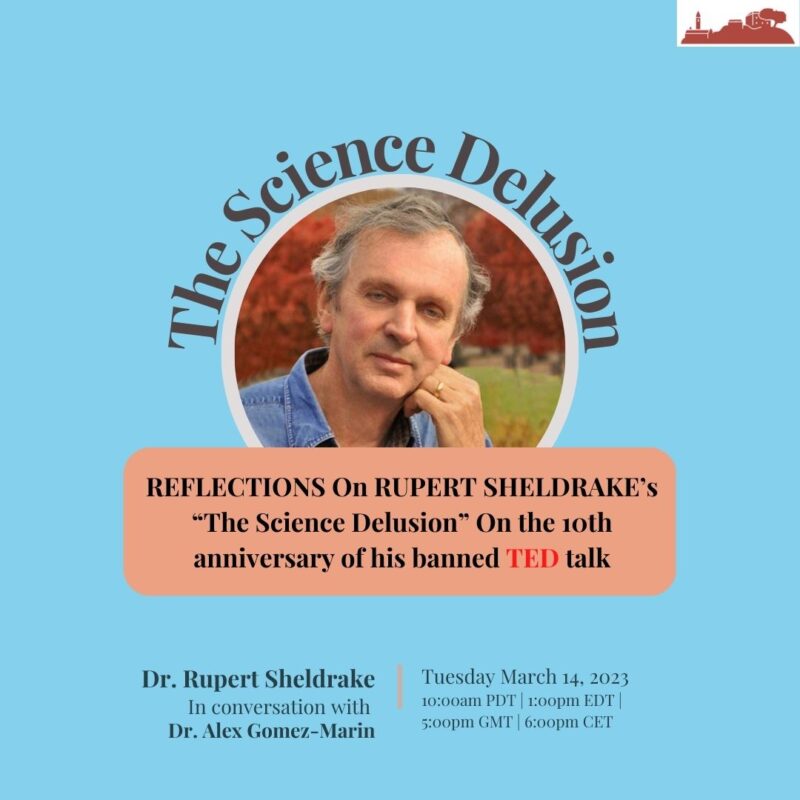Your cart is currently empty!

Reflections On Rupert Sheldrake’s “The Science Delusion”
- This event has passed.
March 14, 2023 @ 6:00 pm – 7:00 pm CET

Watch the recording
Reflections On Rupert Sheldrake’s “The Science Delusion”
On the 10th anniversary of his banned TED talk
Dr. Rupert Sheldrake
in conversation with Dr. Alex Gomez-Marin
Tuesday March 14
10:00am PDT | 1:00pm EDT | 5:00pm GMT | 6:00pm CET
Free Online Pari Dialogue
In January 2013 Rupert Sheldrake gave a talk at TEDx Whitechapel entitled “The Science Delusion” where he questioned ten fundamental beliefs of mainstream science. The event was called “Visions for Transition: Challenging existing paradigms and redefining values (for a more beautiful world)”. After protests from two militant materialists, P.Z. Myers and Jerry Coyne, and in consultation with an undisclosed Scientific Board, TED declared: “we feel a responsibility not to provide a platform for talks which appear to have crossed the line into pseudoscience.”
The irony (and tragedy) was twofold. First, Sheldrake’s questioning of dogmatism was met with a dogmatic canceling of his questioning. Second, despite TED’s famed ethos of “ideas worth spreading”, they deemed other ideas worth canceling, especially when challenging TED’s sanctioned narrow worldview. Mislaying their reputation, TED’s decision refuted itself.
Ten years after the controversy, Dr. Sheldrake will reflect together with Dr. Gomez-Marin on the effectiveness of heterodox critiques of mainstream scientific thinking. Did they make a difference? What has changed, if anything, after such clashes?
Nowadays’ media landscape affords new opportunities to expose and share different worldviews through podcasting and blogging. However, curricula remain unchanged, as students continue to be indoctrinated with the materialist mechanistic reductionist program. In addition, venues such as Wikipedia profess the same unexamined prejudices, and so do major newspapers, TVs, and grant agencies. In the meantime, scientific breakthroughs stagnate.
In this free online event we will ask what has to really change for things to really change.
THIS EVENT IS FREE AND OPEN TO EVERYONE!
You can view the censored TEDx talk here:
https://youtu.be/hO4p3xeTtUA
As well a recent animation by After Skool on “Exposing Scientific Dogma”:
https://youtu.be/sF03FN37i5w
TED’s justification and Sheldrake’s reply:
https://blog.ted.com/open-for-discussion-graham-hancock-and-rupert-sheldrake/
Sheldrake’s book “The Science Delusion”:
https://sheldrake.org/books-by-rupert-sheldrake/the-science-delusion-science-set-free
And a conversation between Sheldrake and Gomez-Marin on scientific dogmatism:
https://youtu.be/nFQWgnVrmZU

Dr Rupert Sheldrake is a biologist and author of more than ninety technical papers and nine books, including The Science Delusion (called Science Set Free in the US). As a Fellow of Clare College, Cambridge, he was Director of Studies in Cell Biology, and was also a Research Fellow of the Royal Society. He worked in Hyderabad, India, as Principal Plant Physiologist at the International Crops Research Institute for the Semi-Arid Tropics (ICRISAT), and also lived for two years in the ashram of Fr Bede Griffiths in Tamil Nadu. From 2005-2010, he was Director of the Perrott-Warrick Project for the study of unexplained human and animal abilities, funded by Trinity College, Cambridge. He is currently a Fellow of the Institute of Noetic Sciences in Petaluma, California and of Schumacher College in Dartington, Devon. He lives in London and is married to Jill Purce, with whom he has two sons. His web site is www.sheldrake.org.

Dr Àlex Gómez-Marín is a Spanish physicist turned neuroscientist. He holds a PhD in theoretical physics and a Masters in biophysics from the University of Barcelona. He was a research fellow at the EMBL-CRG Centre for Genomic Regulation and at the Champalimaud Center for the Unknown in Lisbon. His research spans from the origins of the arrow of time to the neurobiology of action-perception in flies, worms, mice, humans and robots. Since 2016 he is the head of the Behavior of Organisms Laboratory at the Instituto de Neurociencias in Alicante, where he is an Associate Professor of the Spanish Research Council. Combining high-resolution experiments, computational and theoretical biology, and continental philosophy, his latest research concentrates on real-life cognition and consciousness.
